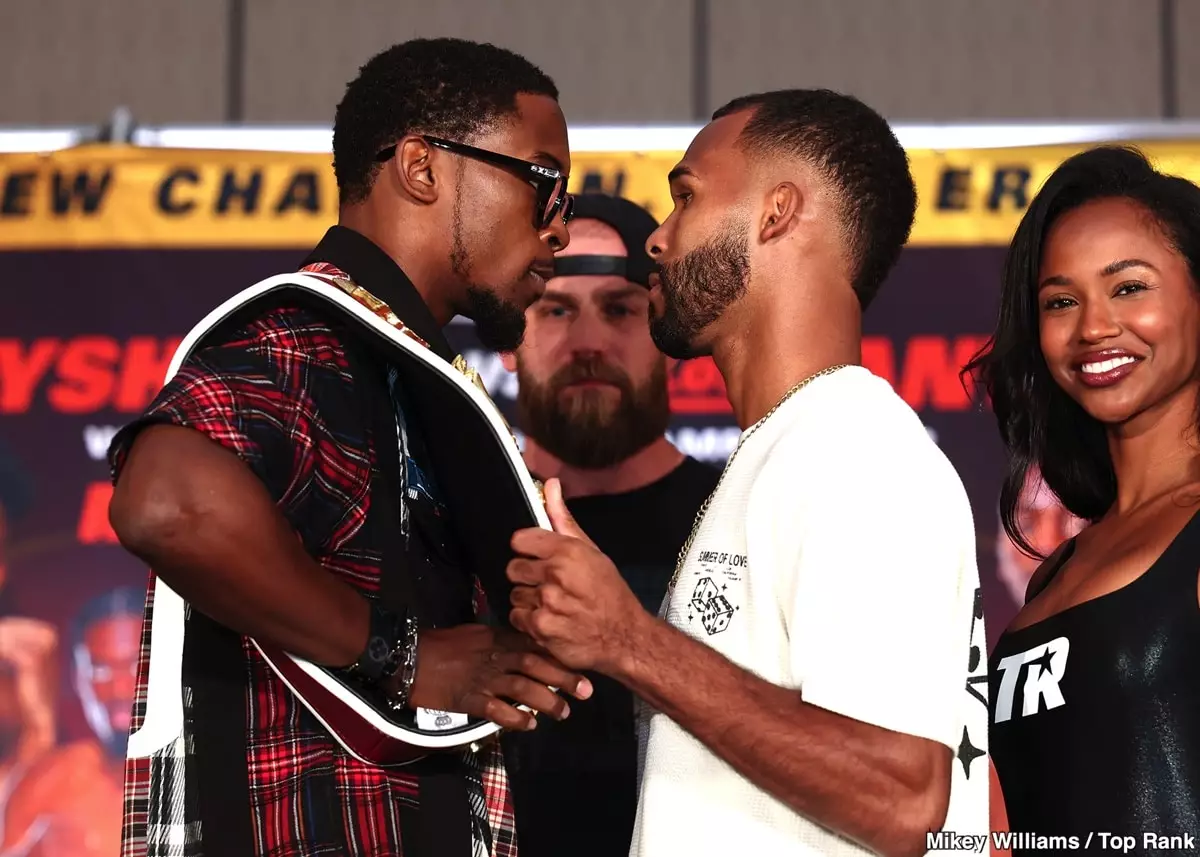In the world of professional boxing, the weigh-in is not merely a procedural formality – it can be a strategic maneuver that sets the tone for an upcoming bout. No case exemplifies this more dramatically than that of Keyshawn Davis and Edwin De Los Santos. Trainer Greg Hackett has raised significant concerns over Davis’s decision to weigh in at an alarming 4.3 lbs over the lightweight limit of 135 lbs. Such a weight discrepancy not only led to an immediate cancellation of the match but also ignited a firestorm of speculation about Davis’s true intentions. Did he deliberately inflate his weight to avoid facing a formidable opponent?
The ramifications of this weigh-in stretch far beyond mere numbers on a scale. In Hackett’s eyes, this was symptomatic of a lack of commitment and perhaps even fear of taking a substantial risk inside the ring. With the implications of this situation resonating through the boxing community, it’s crucial to dissect the motivations behind Davis’s actions and what they mean for his career.
The Weight Advantage: A Tactical Retreat?
Hackett is adamant that Davis’s hefty weight showed a blatant attempt to evade the fight with De Los Santos, whom he considers a serious threat. The narrative suggests that Davis, aware of De Los Santos’s power and skill, opted for a tactical retreat. By coming in heavy, he potentially coerced De Los Santos’s team into withdrawing from the contest altogether. This reveals a hidden layer of strategy; Davis may have calculated that overpowering his opponent and leveraging a weight advantage would insulate him from the outcome he truly feared—a knockout.
Hackett further underscores that if Davis had genuinely prepared for this bout, he wouldn’t have come in significantly overweight. His comments paint a picture of someone who underscored the importance of the match only superficially, leading to the conclusion that Davis may have underestimated the mental toughness required at this level.
The Ghosts of Past Fights
This incident becomes even more complex when one considers Davis’s history with Andy Cruz, a boxer he has faced— and lost to—multiple times. Hackett points out the stark contrast in Davis’s demeanor when Cruz approached him. The apparent intimidation suggests a psychological barrier that Davis has yet to overcome, and it raises pertinent questions: How will these mental roadblocks affect his future bouts? If he finds himself too hesitant to engage with formidable opponents, could we witness a trend of avoidance in the ring?
This dynamic presents a dangerous precedent. A fighter with Davis’s enormous potential should be seeking challenges and not shirking from them. Weight discrepancies, fear of loss, and conflicted psyches converge into a troubling narrative that undermines the integrity of the sport. When a fighter appears timid in the face of competition, it sows doubt among fans and analysts alike—an unsettling thought for someone with intentions of climbing to the top.
The Aftermath: Reputation and Future Fights
Davis’s decision, viewed through Hackett’s critical lens, does more than just cast doubt on his character; it has the potential to be a pivotal turn in his career trajectory. The boxing audience is well aware of ducks and dodges in this sport; they are not easily forgotten. No fighter wants to be labeled as someone who avoids challenges.
The crucial question now becomes: How does Davis remedy this situation? Hackett notes that an apology might not suffice; after such a visible act of obfuscation, the road to restoring his reputation appears arduous. Moreover, fans will watch carefully to see who Davis chooses to fight next. Will it be someone who poses a significant challenge, or will he attempt to sidestep confrontation once more?
The pressure is now on Davis to prove, both to himself and the boxing community, that he is willing to engage wholeheartedly in the ring. This situation serves as a stark reminder of the balance between self-preservation and the pursuit of greatness in the world of boxing. The unfolding storyline of Keyshawn Davis highlights how pivotal moments in a fighter’s journey can redefine their future, for better or for worse. The weight of expectation hangs heavy, and the eyes of the boxing world remain fixed on his next move.


Leave a Reply